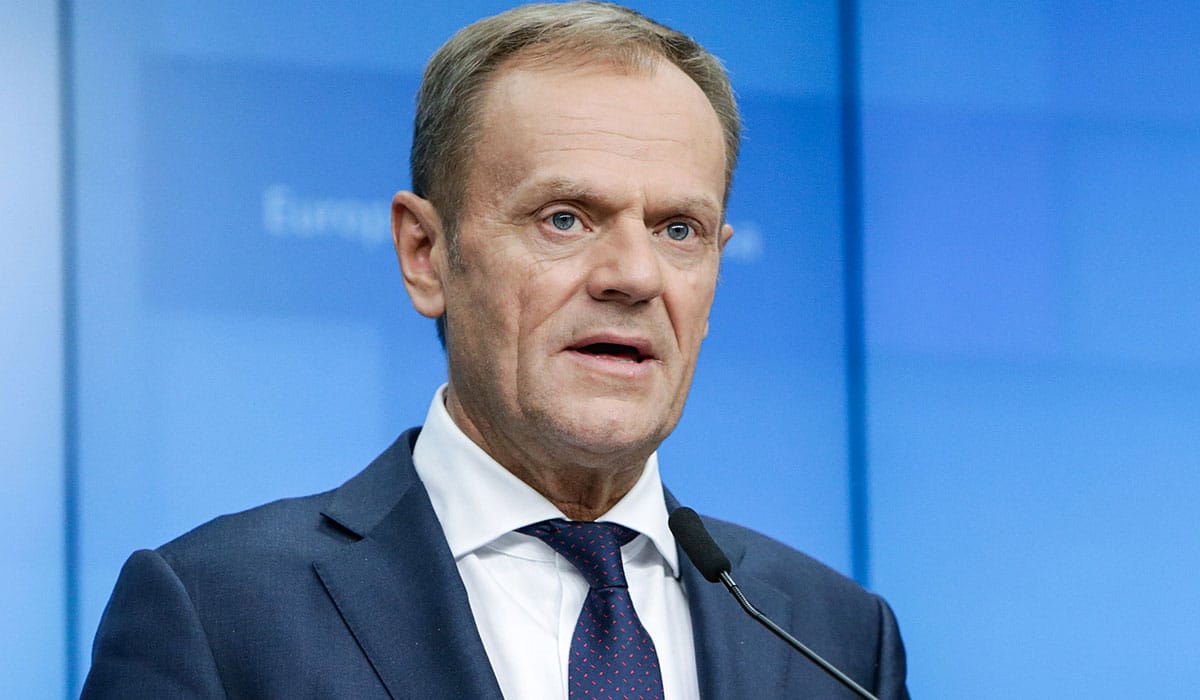Donald Tusk
(Donald Tusk)
Former President of the European Council, former Prime Minister of Poland, President of the European People's Party

Donald Tusk (born 22 April 1957) is a Polish politician who served as Prime Minister of Poland from 2007 to 2014. He was President of the European Council from 2014 to 2019. On 20 November 2019, Tusk was elected president of the European People's Party (EPP), Europe's largest transnational parliamentary group.
Tusk has been involved in Polish politics since 1990 and was a co-founder of the Polish Congress for Freedom and Democracy, of which he was elected president in 1991. In elections that fall, the party won 37 seats in the lower house. In 2001, he co-founded Civic Platform and became deputy speaker of Parliament after the party won seats in that year's elections.
Tusk was elected prime minister of Poland in 2007, and was re-elected in the 2011 Polish parliamentary elections when his party won. In 2014, he was elected President of the European Council, becoming the first president of the European Council from a former socialist country, before being re-elected in 2017.
In office, he adopted a good-neighborly policy, trying to mend relations with Germany and Russia; He helped Poland escape the effects of the economic crisis and maintain steady growth. When the European debt crisis erupted in 2009, Poland was the only EU country to register economic growth.
The American political media Politico commented that he is the most successful politician in Poland in decades.
However, after being implicated in the crash of Poland's presidential plane in 2010, and suffering from the domestic right-wing party's attack, Tusk's situation in Polish politics is not very good.
At this point, Brussels, the "heart" of Europe, extended an olive branch to Tusk.
Tusk's own pragmatic and steady leadership style and pro-free trade economic advocacy have won him the support of Germany's "Iron Lady" Angela Merkel and former British Prime Minister David Cameron.
Therefore, with the support of all parties, Tusk officially became president of the European Council in 2014 and was re-elected in 2017.
In fact, the presidency of the European Council is more about political symbolism than real power. Tusk's main job is to chair regular summits of EU leaders and consolidate the decisions of the 28 sovereign heads of government. After more than a decade of enlargement, however, cultural and economic differences between EU member states have become more pronounced, making integration difficult.
It is understood that during his tenure, Tusk presided over a total of 48 EU leaders' summits, and the EU has also experienced several crises.
When he took office in 2014, Tusk faced the European debt crisis. In order to prevent the debt crisis from becoming a crisis for the whole euro zone, Tusk has replaced his soft style with a tough one to maintain the stability of the euro zone.
One night in 2014, then-Greek Prime Minister Alexis Tsipras and German Chancellor Angela Merkel spent the night negotiating in Tusk's office, unable to reach an agreement into the early hours of the morning, according to a BBC documentary. Just as the negotiations were on the verge of collapse, Tusk closed the door of his office and told the two leaders, "If you don't talk, you won't leave!"
Since then, the EU has faced a series of problems, including the refugee crisis and terrorist attacks. Before I knew it, Britain was about to leave the European Union.
While negotiating with the British government on behalf of the EU, Tusk used fierce words to warn the "leave" people, and played a warm card to the "remain" people, and sought to maintain the achievements of European integration.
Tusk's presidency of the European Union is over; He succeeds the current president, Frenchman Joseph Daul, as head of the European People's Party (EPP), the largest group in the European Parliament.
The European People's Party is made up of conservative parties in several European countries and is the most influential coalition of centre-right parties in European politics. Former European Commission President Jean-Claude Juncker and his successor von der Leyen, German Chancellor Angela Merkel and other presidents and government prime ministers are members of the party.
As the continent's political landscape has become more complex and diverse in recent years, the EPP's grip on power in the EU has also declined. Mr Tusk will be charged with breathing new life into a respected but struggling political "brand".
EPP members generally believe that only a non-Western European, non-German leader like Tusk can help the party regain momentum, recover the seats it lost in the May 2019 European Parliament elections, and defuse tensions between eastern and Western European countries over the rule of law, migration and climate change.